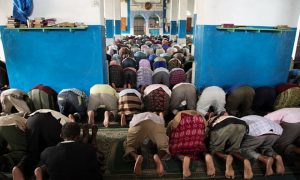Starting in April, U.S. Muslim bar associations experienced the first Ramadan in three years that they were able to meet in person, as restrictions put in place during the COVID-19 pandemic eased or ended completely. Making up for lost time, Muslim lawyers in the Washington, D.C. area recharged their mission of mentoring new and first-generation lawyers. The April 19, the iftar gathering also offered a chance to reconnect with other affinity bar associations, according to Zaheer Maskatia, president of the Capital Area Muslim Bar Association (CAMBA) and a Department of Veterans Affairs attorney. (Iftar is the evening meal that marks the end of the daily fast during the Muslim holy month of Ramadan, which this year ran from April 2 to May 2.)
Shirin Afsous, a CAMBA member and Greenberg Traurig LLP litigation associate, is also president of the Iranian American Bar Association’s D.C. chapter. The April 19 iftar was the first she had spent with people outside her family since April 2019. The support she’s received during her Big Law experience has motivated Afsous to redouble her commitment to helping younger lawyers. “Not having that confidence impacts every part of a young lawyer or law student’s life because if you feel like you can’t speak up, then you’re not going to,” she said. “That’s going to impact what work you get. It’s going to impact your relationships in the office. It’s going to impact how your colleagues interact with you. It’s going to impact negotiations, salary, advancement.”
Rahmah Abdulaleem started her law career in 2000 and is now the Executive Director of the nonprofit Karamah: Muslim Women Lawyers for Human Rights. Abdulaleem acknowledges that many law firms are much more diverse than they were 20 years ago but says diversity efforts remain valuable. “I think it’s very important for minority law students and minority lawyers to have a sense of community, especially when we are a small percentage of the legal community,” she said. “Having that community bar association and having those connections are so powerful.”






















